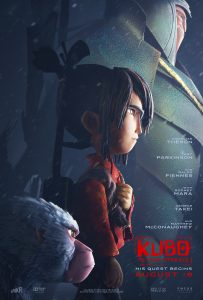Kubo and the Two Strings (2016)
 Release Date: August 19, 2016
Release Date: August 19, 2016
Cast: Matthew McConaughey, Charlize Theron, Rooney Mara, Ralph Fiennes, Art Parkinson, George Takei, Cary-Hiroyuki Tagawa, Brenda Vaccaro
Director: Travis Knight
Studio: Laika
Distributor: Focus Features
Genre(s): Animation action
Review Spoilers: Low
IMDB | Rotten Tomatoes | Wikipedia
It’s incredibly difficult to write a story based around Asian culture and family that I won’t automatically enjoy. It’s an admitted bias that I have when it comes to watching movies with stories that I can so intimately relate to. When they’re respectful stories, told with the kind of attention and care that you see in Kubo and the Two Strings, it’s damn near impossible for the message not to hit home for any audience.
Kubo tells the story of the eponymous young boy (Art Parkinson) who goes on a daring and seemingly impossible mission, accompanied by a monkey named Monkey (Charlize Theron) and a samurai Beetle (Matthew McConaughey). Told through the fascinating and mesmerizing stop-motion filmmaking perfected by Laika Studios, Kubo is a film that finds its aesthetical roots in Japanese culture.
From the characteristic sounds of zithers and Kubo’s shamisen to the colorful and magical paper origami that Kubo creates with his abilities, the film never shies away from the story that it’s telling.
The mystical elements of the film play almost as well as the emotional element, bringing a mythological tone that makes Kubo’s mission almost legendary. There are great scenes of spectacle, with massive action sequences that how off Laika’s impressive animation abilities as well as the majesty of the story itself. The vast change of scenery in every shot makes for a colorful world, one that appears alien at times in its beauty.
What tugs at the heartstrings is Kubo’s own story. His connection to his family, initially severed, becomes mended in a coming-of-age story that is grounded in relatable struggles of grief, fear, self-doubt, and courage. Facing almost impossible obstacles, Kubo, Monkey, and Beetle are a balanced trio. Kubo is kind and courageous, a boy with all the makings of a hero. Monkey, both Kubo’s guardian and talisman, is protective and defensive, a cynical and realistic character who watches over the young hero in a time of tragedy. And Beetle, a cursed samurai forced to take the form of a beetle with no memory of his past life, is similarly brave and strong, dutifully serving Kubo as the son of his master’s house and becoming a close companion to the group.
Powered by the mythological elements of the story, a simple outline that allows for intricacies in character development, Kubo takes the viewer on a bildungsroman story that is framed by narrative elements of Japanese culture. Part of what makes the film so great for me, as an Asian-American, is seeing Japanese culture celebrated. The story itself could have easily been white-washed or toned down, but seeing the film embrace the culture, and the aesthetic, and the teachings inspires confidence in me. It becomes something that a young Asian audience can look up to, something that they can relate to.
Animal characters like Monkey and Beetle come up in Asian mythology all the time — whereas Western mythology tends to lean more on the side of human characters — along with deities like the moon god and the celestial heavens, these aren’t elements of culture and society that we see much in mainstream media, especially not for a younger audience who have to look hard to see themselves represented. Kubo represents an admirable hero whose own courageous tale turns him into an unforgettable, instant classic.
Final Thoughts: We need more films like Kubo and the Two Strings. With stunning animation and heart-warming storytelling, Laika hits the nail on the head with this one and shows off a moving and powerful coming-of-age story that is perfect for audiences of all ages. Don’t miss this one in theaters.